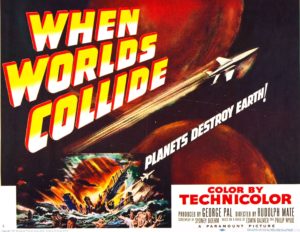So my series of themed reviews, with the theme never explicitly stated, is coming to an end with 1951’s When Worlds Collide.
 George Pal got a serious taste for SF filmmaking when he teamed up with author Robert A. Heinlein to produce the movie Destination Moon. Science-Fiction was to remain a favorite genre of Pal’s for decades after this partnership and his very next film was When Worlds Collide.
George Pal got a serious taste for SF filmmaking when he teamed up with author Robert A. Heinlein to produce the movie Destination Moon. Science-Fiction was to remain a favorite genre of Pal’s for decades after this partnership and his very next film was When Worlds Collide.
Based on a novel by Edwin Balmer and Philip Wylie, the movie is about the end of the world and a desperate attempt to save a fragment of humanity from that destruction.
While for the most part the science is horribly wrong this is one of my favorite SF movies. I have waited and waited for a blu-ray release but it appears that none of in the works and I broke down and via iTunes purchased a high-def copy from the cloud.
This film tries to deal seriously with an existential to humanity’s survival and what facing such a threat could mean on both a species and a personal level. This film established, twenty years before the craze hit in the 1970’s, the pattern found in most disaster movies. A threat is identified by a small group , they attempt to warn others, they are not believed, and then the disaster strikes. In the case of When Worlds Collide a rouge planet, Bellus, with an orbiting co-planet, Zyra, is on a collision course for the Earth. Rejected by the government of the Earth as alarmist our heroes find funding for a fleet of rocket-arks from industrialists, principally Sidney Stanton. Stantion is only interested in saving himself and a cynic when it comes to hoe his fellow humans will react when death comes to claim the, He is not entirely wrong. The scientists, led by Dr. Hendron feel that people can be better than that and he is not entirely wrong. The is one of the aspect of the film that endears me to it, that fact that heavies and heroes can both be right and wrong. There is a love story complete with a triangle, and loads of sacrifice en route to the attempt to save mankind.
In some ways this movie can be compared to the recent SF epic Interstellar. Both deal with global dangers threatening humanity with extinction and present salvation as a requiring establishing an off-world colony. Between the two I own When Worlds Collide and not Interstellar. The dark dreary cynicism of Nolan’s calls into question if humanity is worth saving while such things are never hinted at, even with characters like Stanton, in George Pal’s classic film.
